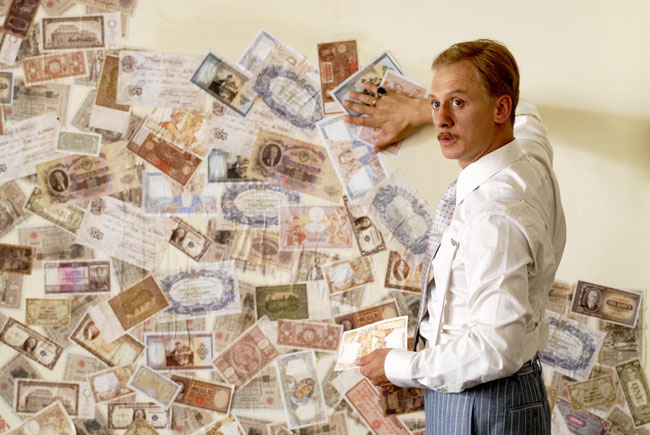|
Reviews of Recent Independent, Foreign, & Documentary Films in Theaters and DVD/Home Video

I SERVED THE KING OF
ENGLAND
The film is based on a 1974 novel by Bohumil Hrabal, as was Menzel's Academy Award-winning Closely Watched Trains, but this fantastical fable couldn’t be further away from that stark and more naturalistic black-and-white classic. Short, pasty, and unassuming Everyman Jan Dite (Ivan Barnev) only has one objective: to be a millionaire. Through episodic flashbacks, he works his way up from a lowly waiter-in-training in a backwater pub to the owner of a five-star resort. He’s a wide-(blue)-eyed innocent with floppy blond hair and a crooked nose, a ball that bounces from one opportunity to another. Morals never come into play in his quest. At the end of his working day, he takes pleasure in counting and spreading out each individual bill, covering his hovel’s floor. Although Jan narrates throughout, he doesn’t actually speak until 20 minutes or so into the film, and he has no need to—Menzel relies more on visual gags and action; he knows how to brilliantly set up jokes. The sight of the slightly built Jan, kicked in the rear or receiving a slap to the head by a physically imposing boss, is straight out of a Charlie Chaplin two-reeler, as are his double-takes. Jan’s the most Chaplinesque underdog since Roberto Benigni in Life Is Beautiful. Though Jan also navigates through the German invasion of Europe, don’t worry, there’s no concentration camp kitsch. Not that Menzel keeps the tone light and sweet. We see warning signs, Jan rejects them. He lives in an absurdist universe, even before Germany takes over Czechoslovakia. (It would be a stretch to equate the decadence of the film's class-stratified world of orgiastic consumption before the war to the Third Reich’s dream of an Aryan paradise.) Jan’s blindness to the German occupation all comes down to a girl, Liza, who could have taught Eva Braun a thing or two. A Czech of German origin, she’s all things Third Reich. Like Jan, she’s single-minded, in her case, to serve and obey Hitler. (Mel Brooks would be envious of a bedroom scene with Jan, Liza, and a portrait of Hitler.) As the fanatical Liza, Julia Jentsch obliterates her image as the title character of Sophie Scholl: The Final Days, the anti-Nazi activist and martyr. Because
the film opens with an older Jan (now Oldrich Kaiser), fresh out of a
Communist prison more than 15 years after the war, it’s just a matter of
time until the happy-go-lucky opportunist meets some sort of
comeuppance, and it’s here where the film loses steam. Jan,
at last, has a chance of heart, or so we’re told. Unlike the rest of the
film, it’s not dramatized. The pat ending, with Jan resettling in an
abandoned village, feels as though Menzel has run out of his bag of
tricks. Jan now sees the past in a different light, but his optimism
remains the same—a transformation without cost. But it’s the journey to
that point which lingers. Kent Turner
|

